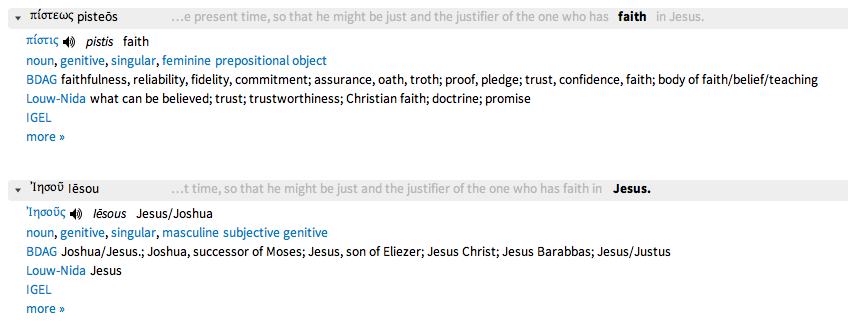For instance, what if someone were curious how to perform a complicated search in Logos, Accordance, or BibleWorks?
I genuinely am torn on this issue, because I don't want to see product reviews or software comparison questions, but it would also be nice if someone didn't know how to perform a given query.
Also, some of the tools have evolved to the level of practically being a source of information, and at times these sources make controversial assertions without notifying the user of alternative interpretive options. My primary concern is that as more and more connections and interpretive tools are created, more and more subjectivity is involved. A great example of this can be seen in the Logos 5 exegetical guide’s syntax tagging for ‘Jesus’ in Romans 3:26. The morphology is of course correct (‘Jesus’ is in the genitive case), but the syntax tagging tool takes the extra interpretive license to say that this particular word is in the subjective genitive (which is a highly debated interpretive position).

In other words, the syntax tagging is telling me that the ESV has incorrectly translated Romans 3:26 as “It was to show his righteousness at the present time, so that he might be just and the justifier of the one who has faith in Jesus.” According to the syntax tagging, this passage should be translated as “This was also to demonstrate his righteousness in the present time, so that he would be just and the justifier of the one who lives because of Jesus’ faithfulness.” That’s a big difference, and a hotly debated interpretive solution. Obviously one’s knowledge of the original languages comes into play here to agree or disagree with the interpretive decision made, but for a weaker language student there is no indication that there is even another option here. Good commentaries and other tools can tip the student, but I think the syntax tagging should at least indicate that there is some disagreement in circumstances such as these. It might be helpful to point these issues out and/or challenge them in questions and answers.
Then again, this sort of thing could just as easily be answered my merely asking about the text itself (Logos says X about this text, is it correct?). Hence why I'm torn. Thoughts?